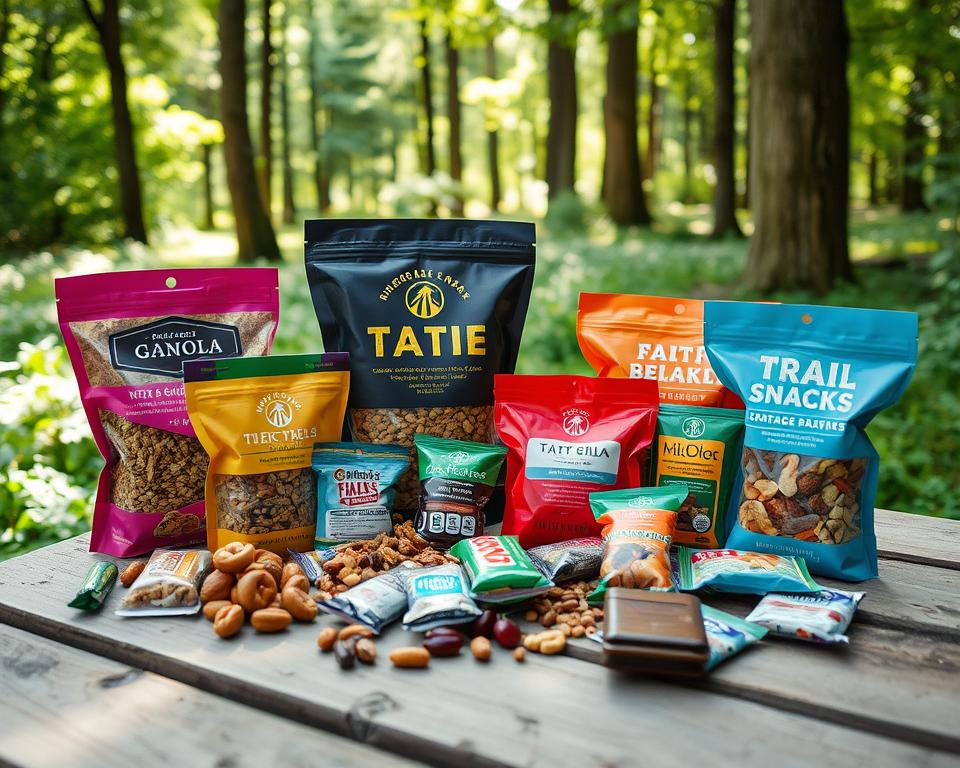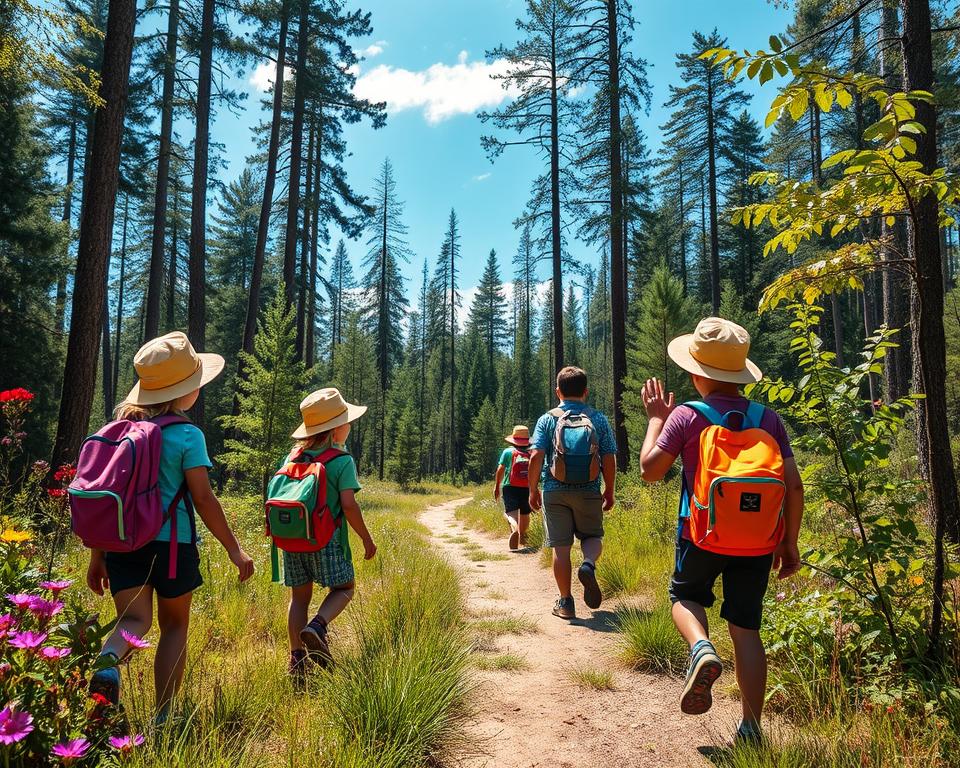Hiking with kids mixes family fun with nature. A well-planned packing list is key to making sure these hikes are both fun and safe. The gear needed for kids goes beyond just snacks and sunscreen.
For a successful family hike, knowing what to pack is crucial.
Starting your hike in the morning and returning in the afternoon is wise. It lets you make the most of the daylight. A good backpack is vital for day hikes. The Osprey Daylight Plus, now called the Packlite, is ideal because it’s easy to carry and comfortable. To stay hydrated, a 32-ounce Thermoflask is perfect for keeping water cold.
Also, bring extra socks, which can double as mittens. Always have a set of spare clothes that anyone can wear, just in case.
Kids need to wear bright clothes so they can easily be seen. They might also wear an ID bracelet for extra safety. It’s important to have a map since you might not always have cell service. A headlamp is also essential, preparing them for any situation.
Choose hiking gear for kids that is practical. For example, sunglasses that don’t fall off are great for sun protection.
Every piece of your child’s hiking list should have a purpose. This includes healthy snacks, plenty of water, clothes suitable for the weather, and safety items. A well-packed backpack makes the hike easier. It ensures you create lots of happy memories on your outdoor adventures with your kids.
Choosing the Right Backpack
Selecting the perfect backpack for hiking with kids is key. The right backpack improves comfort and convenience. It also enhances the hiking experience. There are many types of daypacks and family hiking bags. Let’s look at what makes a backpack great for family hikes.
Key Features to Look For
Here are essential features to consider in a backpack:
- Comfort: Padded and breathable mesh straps reduce shoulder pressure.
- Stability: Waist and chest straps spread the weight, adding stability.
- Storage: Lots of compartments and pockets keep things organized.
- Hydration Compatibility: It’s important for the backpack to fit hydration bladders for easy drinking.
These features help make sure that family hiking bags are effective. They keep both adults and kids comfortable while hiking.
Backpack Recommendations for Parents and Kids
The Osprey Daylite Plus is an excellent versatile daypack. It’s light but still functional, great for short hikes. The REI Traverse 32 offers more storage. It’s good for bigger families or winter hikes.
For carrying kids comfortably, try Beco, Kinderpack, or Trail Magik. They focus on comfort for both the child and the adult. This ensures a good hiking experience for all.
Choosing the right backpack and family hiking bags is crucial. Especially if they have kid carriers. It simplifies your hiking gear and makes every trip enjoyable.
Navigation Tools
Being able to find your way in the wilderness is key, especially when you’re hiking with kids. Using both new and old ways to navigate can keep you safe and ready for anything on the trail.
Using Mobile Devices and Apps
Use the technology in smartphones to find your way. Hiking apps like AllTrails are great because you can download maps to use offline. This means you’re still good even if there’s no cell service.
For example, I use Gaia GPS to plan my routes and as a backup off the trail by tracking my walks. These apps give you accurate GPS details for trails, helping you to not get lost.
The Importance of a Compass
Even though tech helps a lot, a compass is still essential for hiking safety. The British Mountaineering Council in 2016 said knowing how to use a compass is crucial. This is because relying too much on GPS can lead to bigger problems if the tech stops working.
Learning to navigate with a Suunto compass, for example, makes a big difference. Always bring a compass and practice using it to get a good mental picture of the land.
Preparing Offline Maps
Offline maps are a must-have for places without reliable cell service. Before you go hiking, download maps onto your smartphone using apps. Also, bring a paper map just in case.
This way, you’re set no matter what happens with your tech. Telling someone your route before you leave is another good step to stay safe.
Food and Water Essentials
When hiking with kids, it’s crucial to have nutritious snacks and enough water. This helps keep your kids full of energy and hydrated during the hike.
Nutritious Snacks for Kids
Kids use a lot of energy while hiking, making the right snacks important. Good options include:
- Dried fruit bars and fruit snacks like Zbars and Larabars. They are tasty and good for you.
- Almond butter packets offer a quick boost of protein.
- Easy-to-carry fruits like apple slices and bananas.
- Classic trail mix with nuts, seeds, and dried fruits.
- Cereal and oatmeal bars, which are convenient to eat on the move.
Keep perishable snacks cold with ice in a cooler, keeping them below 40°F. In hot weather (90°F or higher), don’t leave perishable food out for more than one hour. In cooler weather, no more than two hours.

Hydration Tips and Tools
Being hydrated is key for both kids and adults while hiking. Adults should drink about 2 cups of water per hour. Children need 1 to 2 cups per hour. Here’s how to keep everyone hydrated:
- Opt for water bottles or hydration bladders that are easy to clean.
- Kid-friendly hydration packs, such as the CamelBak Mini M.U.L.E. or Osprey MOKI, are perfect. They hold about 1.5 liters of water.
- Having a Kid’s Thermoflask bottle encourages kids to drink water. They fit well in backpacks.
In case of emergencies, have a LifeStraw handy. It can make any water safe to drink. Making sure everyone drinks enough water is essential for a fun hike.
Being ready with the right food and water can make your child’s hiking experience much better.
What Kids Should Carry for Their Safety
When hiking with kids, equip them with the right safety gear. This ensures a safe and fun experience. Teaching kids responsibility and how to be prepared makes them confident hikers. They learn the value of safety in the outdoors.
Items to Have Outside Their Backpack
Some safety items should be reachable outside the backpack. I make sure my kids carry:
- A whistle for attracting attention in emergencies.
- A small pocket knife for various needs.
- A personal identification card with emergency contact info.
- A hat and sunglasses to protect from the sun.
Essentials to Pack Inside the Backpack
In their backpacks, children should have a children’s outdoor emergency kit. Here’s what to include:
- Rain jackets or ponchos for unexpected rain.
- Healthy snacks like nuts and granola bars for energy.
- Extra food and water for hydration and nutrition.
- Emergency bivy sacks for warmth and shelter.
- Compact flashlights or headlamps for the dark.
- A basic first aid kit with bandages and pain relievers.
- Sunscreen and bug spray to protect the skin.
Teaching kids Leave No Trace principles promotes responsible outdoor behavior. Encourage them to bring mini backpacks or cameras. This makes the safety gear an essential part of their adventure. They learn to respect and appreciate nature while staying safe.
What Safety Essentials Should I Consider When Hiking with Kids Using Child Carriers?
When hiking with kids using child carriers, safety is paramount. Choose the best hiking carriers that provide excellent support and safety features, such as padded straps and secure harnesses. Always check the weight limit and ensure your child is comfortably seated. Keep a first-aid kit handy for emergencies.
Dressing for the Elements
Dressing right is key when hiking with kids. It keeps everyone comfortable and safe. To make your hike a success, choose the best children’s hiking clothes. Also, use layers to handle different weather, focusing on temperature control and sun protection.
Clothing Layering Tips
Layering is vital for hiking in various weather conditions. Start with moisture-wicking base layers from materials like merino wool. They prevent chafing and keep skin dry. Next, add a fleece or down layer to keep warm. Finally, a waterproof outer layer protects against wind and rain. Brands like Columbia and Eddie Bauer have great gear for this. Don’t forget about gaiters and sturdy hiking boots for extra safety and comfort.
Protection from Sun and Cold
Sun protection is crucial, especially in sunny places like Maui. Get your kids broad-brimmed hats, UV sunglasses, and sunscreen with SPF 30 or higher. Reapply sunscreen often, especially if they’re in water. In cold areas, keep your child warm with gear like SnowStoppers gloves and hats. These not only keep warm but are also waterproof. Always pack a first aid kit with bandages, anti-itch cream, and insect repellent patches. Proper gear makes hiking enjoyable for the family.

